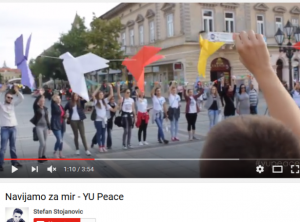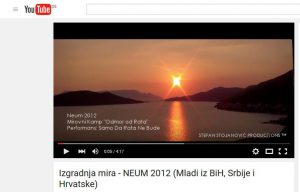
Our ongoing work in the former Yugoslavia– The Youth United in Peace network
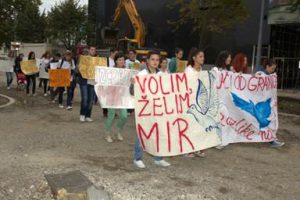
After the peace camp at the seaside, many young people have the wish to maintain their new friendships, to spread the feeling of community at home and to actively advocate for political change.
After the peace camp, a variety of follow-up activities take place, some of them are organized by our partners in the “Youth United in Peace” network, some of the groups organize activities and actions independently in their cities.
Three countries, five cities – a common network

In order to further promote cooperation across borders and to make this ccoperation more visible, in summer 2014 our partner organizations and former participants founded a joint youth network called Youth United in Peace, which has a common logo in Serbia, Croatia and Bosnia-Herzegovina. On December 8, 2016, a bit more than two years after its foundation, Youth United in Peace received the “Krunoslav Sukić Prize” from the “Center for Peace, Nonviolence and Human Rights” in Osijek, Croatia. This was a wonderful encouragement for the young peace activists and shows how important young people are for a peaceful future of their countries. In their statement at the award ceremony, they wrote:
(…) Youth United in Peace. The sentence sounds surreal. In this time and region, national chauvinism denies everyone the right to look to the future who is not primarily concerned with the past and who doesn’t see it from the perspective of their ideology. Youth United in Peace seems like a platitude. And it would be a platitude if real young people were not behind these words. You are not afraid to look into the past. It takes courage to look at what has happened in this area and in a way that opens the door to another future. It takes courage to meet, get to know each other and get close, to be honest, to be active together and to overcome the new boundaries. (…)
In the meantime, YU-Peace has become a strong network. All activities of Speak up in the former Yugoslavia are planned together with and implemented by the YU-Peace network.
Former participants of the seaside camps who are still very active meet each year for a joint camp to plan activities for the future and to discuss current political developments. The camp takes place alternately in one of the cities of our partner organizations. Among other things, it helps to anchor activism for peace and political and social change even more firmly in the everyday lives of young people.
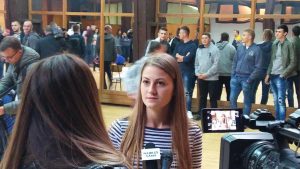
In addition, the local media regularly reports on these camps, the participants were received several times by the mayors of the respective cities and meetings with local youth organizations took place. Though joint performances, the issues of the network are spread in local publics.
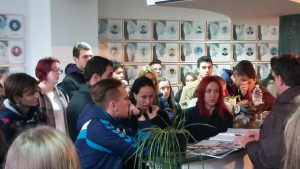
In summer 2015, the group planned a follow-up camp in Srebrenica to advocate peaceful coexistence on the 20th anniversary of the massacre. Many parents were afraid to let their children travel to this Bosnian city that became the epitome of war. Some participants cancelled because of their families‘ worries. As the booked hotel in Srebrenica was closed due to a tax offense two days before the group’s arrival, the participants had to live in nearby Tuzla, but the youngsters visited the memorial for the Muslim victims of the massacre in Potocari and a memorial room for Serbians killed in the war.

Another important part of the network’s follow up activities are the so-called “weekend visits”. On average twice a year, young people from the partner cities visit active people in another city. Here, the young people do not only get to know the places of residence and living conditions in the respective cities, these weekend visits also actively contribute to the dismantling of prejudices and hatred among the parent generations: the youngsters are mostly accommodated in local families, which enables personal contact. The bond between the young people is strengthened and at the same time the parents of the host youth get to know the children of the “enemy” while living with them for a weekend. Often, these weekends feature a joint peace performance or some other public action. Additionally, the young people become active for the host city, for example, to tidy up playgrounds or to help renovate a youth center.
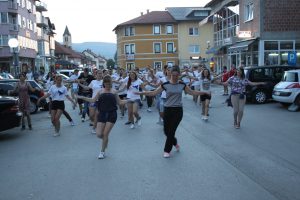
Already at the seaside, the participants often plan for political actions in their hometowns. Twice on the way back from the seaside camp, everyone made a long detour on the way home to support the participants from Gornji Vakuf-Uskoplje (GVU). Here, Croatians and Bosniaks still live separately; the city is divided by an invisible but always present line. The young people perfomed a peace ralley through the divided city to show their wish to end this separation.
On the first day of school after the summer holidays, many participants in all five cities wear their seaside T-Shirts with the common slogan of “their” peace camp. Many participants from previous years also come to school with their T-shirts to express their solidarity. Every year they organize peace marches in their cities on the same day to promote peaceful coexistence. In 2016, they made 1,000 origami peace doves, which they distributed to the public in Sombor during a public performance.
Political and social activism
The youngsters also react to current political developments in their countries. When the city administration in Jajce, Bosnia-Herzegovina, wanted to build its own school for Bosnians in 2016, the students vehemently resisted it. They launched street protests, wrote letters to local politicians and the state government, and threatened to boycott the new school: „We will not be poisoned by the nationalism of this state, which divides everything into three ethnic groups,“ they wrote. And their protest was successful, the city administration gave up the plan to build the new school. An active pupil said in an interview: „The most important thing is that the pupils won, even though they were not supported by their parents, their teachers and the local community, who ducked away throughout the argument (…) this is proof that even pupils can undo political decisions with their actions.” (Quote from the online portal Buka, Bosnia-Herzegovina).

Also, in 2017 and 2018 YU-Peace activists joined demonstrations against corruption, political arbitrariness and nationalistic tendencies. In 2017, many Serbia-based YU-Peace activists were engaged in demonstrations and non- violent actions against the irregular election of President Alexander Vucic. In 2018, also in Bosnia and Herzegovina young (and old) people throughout the country protested against corruption, misuse of political power, nepotism and arbitrariness.
Moreover, YU-Peace activists regularly involve in social activities to support and show solidarity with people in need, like the support of refugees, showing solidarity with factory workers or engagement in neightbourhood solidarity networks during the Covid-19-pandemic.
Their activities always attracted a lot of attention in the media. Already in 2012, they uploaded a video singing the song “Samo Da Rata Ne Bude”, a song with which the singer Dorde Balasevic warned in 1986 of the looming war. The video attracted a great deal of attention in all three countries: the clip was clicked around 70,000 times in the first two weeks, the major daily newspapers adopted it in their electronic editions, and there was intense discussion on 129 platforms. There was nationalistic hostility, but there was also a lot of enthusiastic support for the action, and numerous commentators reflected upon their own role before, during and after the war.
Going beyond youth
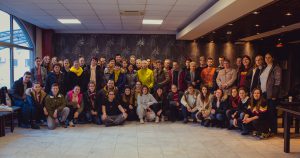
„Peace with a female face“
Through the contacts YU-Peace made with other human rights and peace organizations in the region, some initiatives and projects beyond Speak up have come up: After Ajna Jusic gave a talk at the peace camp in summer 2019 about her organization „Forgotten Children of War“ and their actions, our Serbian partner organization Link took up the topic of mass rape during the war and organized a conference on this subject together with YU-Peace and Medica Mondiale in early February 2020. There was then an online campaign to make rape visible as a war crime on the one hand and as a current reality on the other. Under the motto “Never again! – No woman should have to suffer rape anymore!” women and men are calling for recognition of the survivors and to an end to the outlawing of those affected. The project launched by “Link” not only aims at women’s rights and the dialogue between people of different identity groups, but also stimulates dialogue between the generations. Thanks to the YU-Peace network, the work of Speak up now spreads into society beyond youth.

